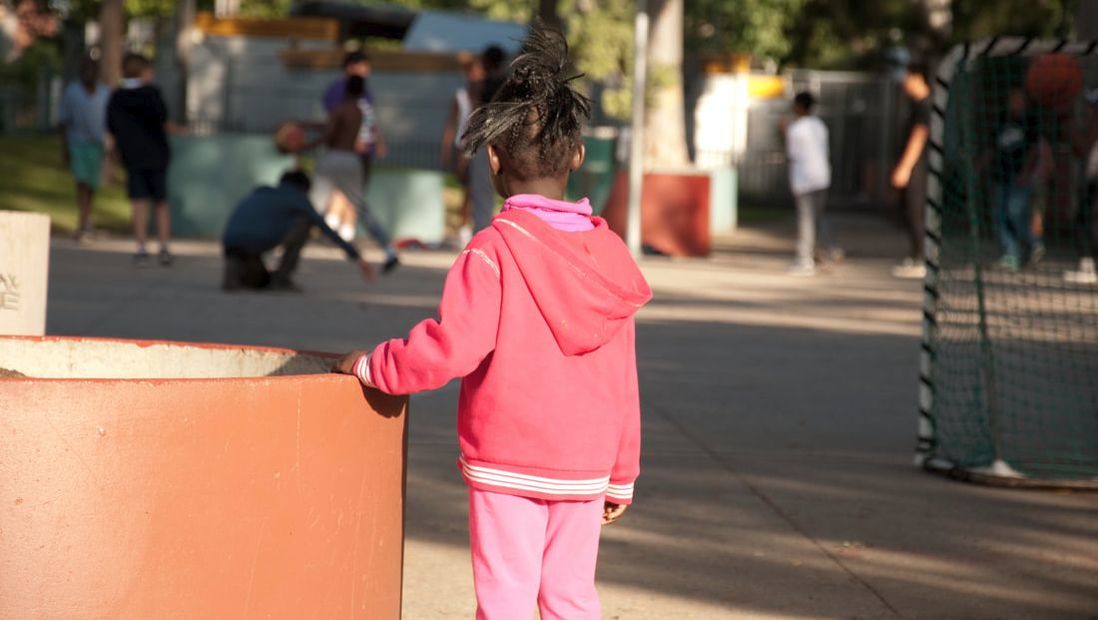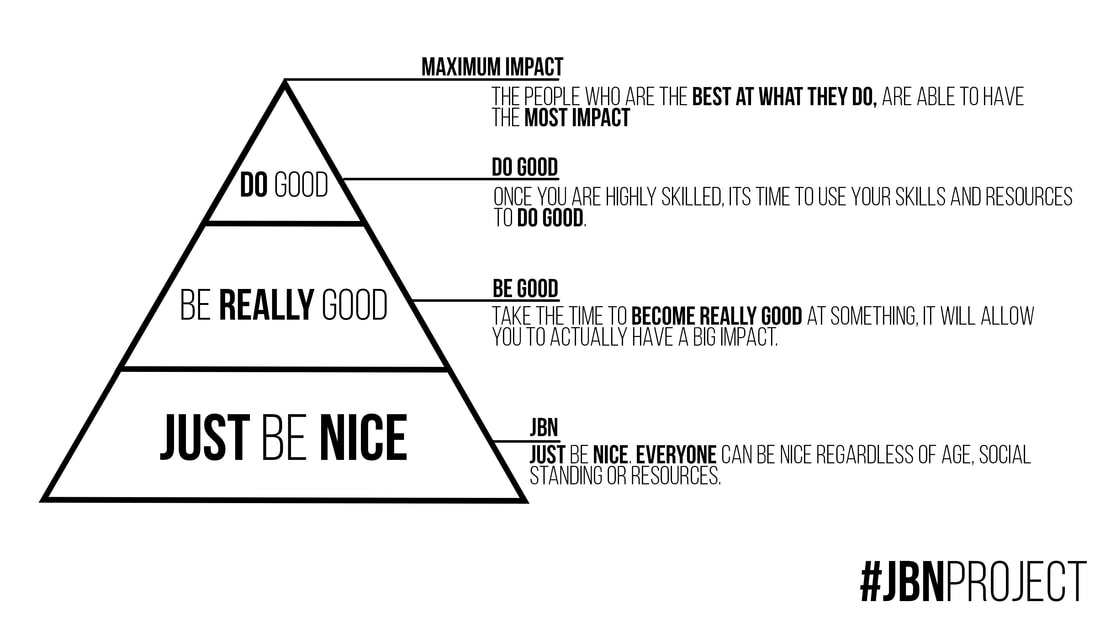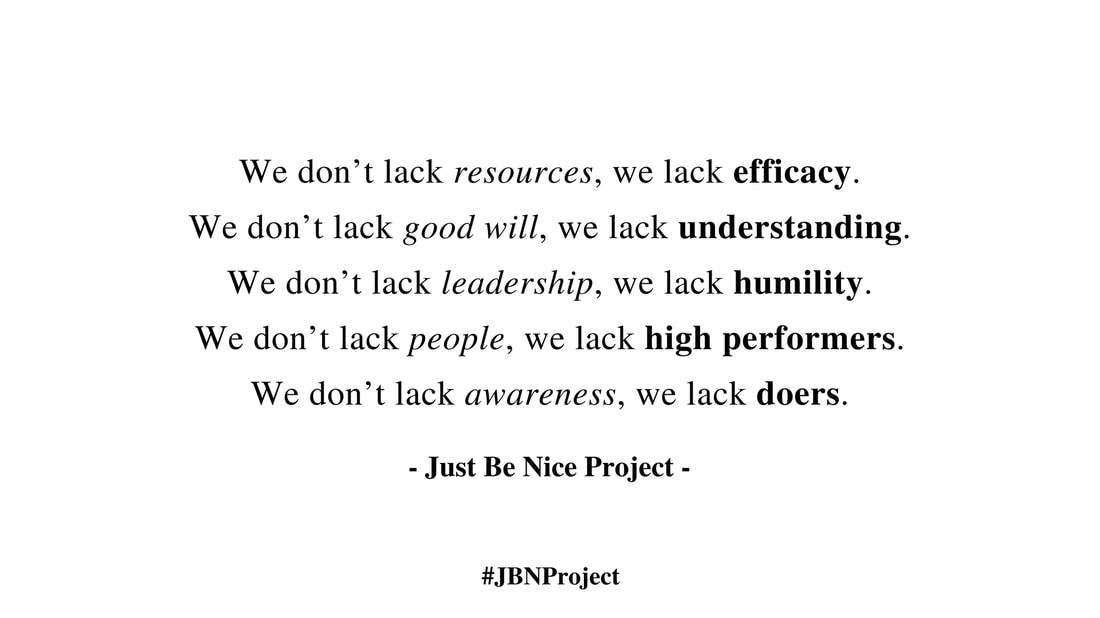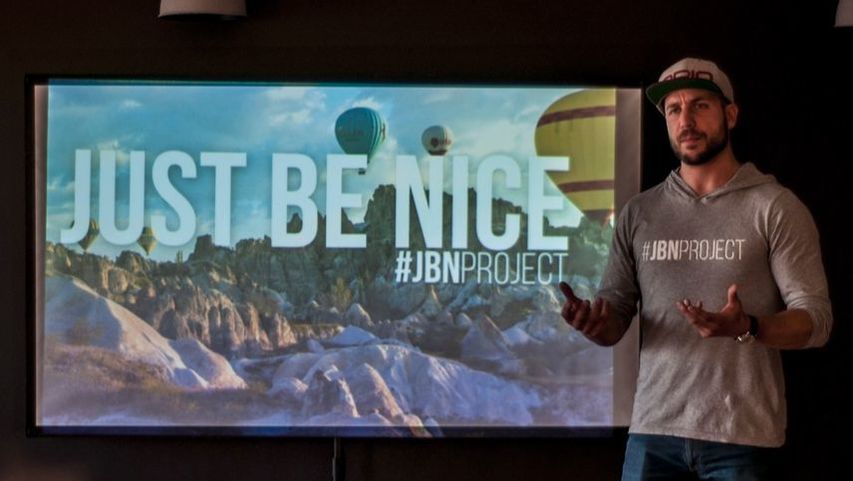|
People need to grab onto opportunities with two hands and wring every bit of potential out of it, they need to be self-motivated, opportunity seeking missiles, capable of seizing each shred of opportunity that comes their way.
Unfortunately, this is the attitude of many individuals, corporations and even government agencies. It is not, however, the view of the Just Be Nice Project. In a commercial marketplace, the consumer is not blamed for not knowing of the existence of a particular product, store or service. It is the job of the organisation of individual delivering goods to make their wares known and accessible. Don’t market well? Your business will fail. Don’t place your shop in a good location, where people will potentially go to purchase your goods? Your business will fail. Don’t explain your services well enough, or pitch them to the wrong audience? Your business will fail. The onus in a commercial marketplace is on the provider, not the consumer. Consumers may do their research, they might dive deep if they know the kinds of product or service they need. Depending on the time they have and their resources they may study variations of different related products and decide which one is best for them. It seems strange then, that we take a different attitude towards social welfare, and services that are available to people going through a tough time. It would seem that putting together a program that is only accessible after trawling through pages of internet links, hours of phone calls and dozens of pieces of paperwork counts as a good way to equalise the levels of opportunity for people at risk. If a bulk-billing clinic has no signage to that effect, no webpage and no direct connection to services that can refer clients to them, is it really an opportunity for people who can’t afford to go the GP? Is a scholarship opportunity to a good school really an opportunity if the vast majority of eligible students aren’t aware of its existence? Even further, what if they aren’t aware of it’s relevance, having never seen among their peer group, the advantages of a really great education. Not understanding opportunity is not the fault of the people who need it, it is the fault of the mechanisms that seek to balance the ledger. We cannot simply plonk a one-dimensional ‘opportunity’ in front of people that do not understand its importance, and expect them to seize it. In relation to violent crimes we often call this victim blaming. Blaming the victim for not taking enough action to avoid a dangerous situation, regardless of their capacity to anticipate or understand what may or may not happen. Taking the responsibility away from the person causing harm, and onto the person who suffers. An opportunity only exists insofar as it is known, accessible and complete. Providing opportunity comes with a responsibility to ensure that the point of it is understood. It comes with a responsibility to make it as easy as possible for people to access it. It comes with a responsibility to help people navigate the opportunities through to an outcome. The time has come to put the onus on the delivery systems, both public and private. Take the responsibility for the lacklustre uptake, work harder in your target markets to provide understanding as well as outcomes, and improve the equality of opportunity for people who need it.
A bad thing happens and it affects someone;
That person doesn’t like how it’s dealt with. They do a little bit of something to remedy the situation. They feel good. They ask for money to do more of that thing. Sound familiar? It’s the anatomy of a massive proportion of the 600,000 non-profits that currently operate in Australia. The ‘bad thing’ could be a particular illness, it could be walking past someone who is homeless and feeling sorry for them, it could be watching a friend of family member struggle with a mental illness. I feel for people who have been through a tough time. It can be a pivotal moment when something illuminates a situation of disadvantage and difficulty for someone. Unfortunately, the starting of something new is often the wrong way to really have a significant impact. “All significant impact occurs on the other side of being good.” All significant impact occurs on the other side of being good.”
If you want to help kids with their football skills, a person who has never seen a football before is not going to do as good a job of coaching as a footballer with a Brownlow medal. Simply recognising that the coaching for your kids isn’t going to happen doesn’t make you an expert in coaching.
Of course, there are occasions where people jumping in to help out can be a massive help and relief for those that need help. The problem is, so often people start a new enterprise/organisations/movement without taking the time to check a couple of things:
What I would do, is find the person who does have those skills and make it as easy as possible for them to fulfil the function of coach. Yes I wouldn’t be the hero of the situation…. But the kids would get the coach they need. Too often we see good will and good intentions as a substitute for actually being good. Regardless of your intention, the most impact you are going to be able to have is always at the pointy end of the skills that you have. The more good you want to do…. The better you have to be. Want to change the world through computer programming? Build elite computer programming skills. Want to perform game-changing brain surgery? Become a world class brain surgeon. Want to cure cancer? Become a leader in the field of cancer research. In the race for people’s dollars and sentiment, the non-profit sector has encouraged and fostered a system of transactional good that asks for things it knows you have without trying to understand your individual skill sets. What do people like doing? Fun Runs? Dinners? Drinking? Eating bite sized portions of delicious chocolates? Wearing clothes? What is the easiest thing to ask for? Money? GoFund Me, and other online fundraising sites are simply digitised tin rattling platforms for social welfare programs. Offering not one iota of oversight into the efficacy or expertise of the people actually asking for money. Marketing has taken the place of efficacy. Simplifying the input and glorifying the output, all to help people feel like they’re having an extraordinary impact. How can we justify the most efficient use of accountants time, by taking them to work in soup kitchens? How many people lack accounting skills that could serve food? How many of those could help with tax returns or financial literacy? The Just Be Nice Project is predicated on three main steps to individuals being able to have impact. 1.Just Be Nice: This is the first step and its one that everyone can do. Regardless of age, resources, experience, we can all take the time to be a little bit nicer. If we were all nice then there is no doubt the world would be a more pleasant place. It is the bedrock of good character. 2.Be Good At Something: This is the most important step en route to having a big impact. Put simply, the better you are at something, the more impact you are able to have. You will do things faster, more efficiently and with more mastery. It’s not sexy, because it means you have to take the time to go and improve yourself, but it is the most important step to big impact. 3.Do Good: Once you are being nice, and are good at something… You are ready to do the most amount of good. It’s not to say that you can’t do any good along the way, but the most impact you can have is on the other side of being good at something. There aren’t many people at this end, because being better at something puts you in rarefied air. The harsh reality is, not everyone can simply have the same amount of impact as someone else because they have good intentions.
If you really want to change the world, start by being good. Bill Gates didn’t set out to cure malaria in 1975, he set out to build a software company. Turns out he was really, really good at it, and now, on the other side of being good, he has the resources to re-write history and potentially eradicate diseases.
In the scheme of Impact, Bill Gates is now in a position to eclipse the wide range of well-meaning, crowd funded, duplicate organisations that are funded on good intentions rather than well rounded expertise and humility. At the Just Be Nice Project we believe: We don’t lack resources, we lack efficacy. We don’t lack good will, we lack understanding. We don’t lack leadership, we lack humility. We don’t lack people, we lack high performers utilising their actual skill sets. We don’t lack awareness, we lack doers. Give permission to people to go out, just be nice and take the time to be really good at something, and watch their ability to have serious impact grow in the long term. This is a call to action to businesses and individuals that are good at something. We care. We want to give you the opportunity to do good by doing what you are good at, bringing purpose to the effort you have already put in, and helping you develop your abilities and resources further while having maximum impact. We aren't here to tell you what you are good at, we want you to tell us, so we can help you, help others. JBNProject Founder - Josh Reid Jones
First responders are the first to the scene of an accident. They are equipped to evaluate, stabilise, treat chronic injuries and hand over to the hospital with a report of everything they know so that the hospital can make the patient well again.
We have an additional ~394,762 first responders on the front line of disadvantage every day… if we take the opportunity to give them the skills, resources and a place to pass on those who need assistance. Real first responders deliver people to hospitals, teachers need to be able to bring their students over to a system that can treat their inequality of opportunity. Teachers are an incredible resource. They care, they’re present in the lives of children over half the days of a child’s life from ages 5-15 (often longer), and they are in prime position to help identify signs of economic, emotional and physical distress in their students. All of this is for nothing though, if we don’t teach them how. It is all for nothing if we don’t take their feedback and start to build infrastructure specific to communities, classrooms and individuals, to enable these first responders to take stock of a situation, gather the necessary information and then have access to the help that their kids need. There is no one-size-fixes-all solution here. We need to acknowledge that in a class of 20, perhaps only 2 or 3 students will need this kind of extra attention, or perhaps all 20 will. We need to acknowledge that a school that is predominantly full of second generation migrants from one corner of the globe has different stresses and demands to a classroom that is full of upper middle class students, or Indigenous Australians, or low-socio economic 5th generation Australians. Teachers and school administrators have so many opportunities to be the ‘canary in the coal mine’ that we could utilise, and it would give;
The Just Be Nice Project is working to give teachers and administrators the opportunity to upskill their understanding and infrastructure to positively impact their students and the broader community.
An external organisation that brings together information across different school communities to share strategies and best practices for helping alleviate inequality of opportunity. Working alongside curriculum/learning outcomes with organisations like Education Changemakers and events like Educhange who do amazing work improving teacher led innovation and learning design inside classrooms, ensuring teachers and students have a fantastic learning experience.
We want to make sure that no teacher ever quits because of the heartbreak of seeing a classroom where 5 kids never have lunch or breakfast, where children’s clothes are tattered and their shoes have holes, where children carry the stresses of their parents because no-one is attempting to alleviate the invisible poverty and inequality that happens behind the doors of thousands of homes across the country. Right now, teachers see these scenarios every day and short of dipping into their own pockets, are overwhelmingly lacking support to even talk about these issues and how it affects their ability to teach. We look forward to helping more schools and teachers become well-resourced centers for improving the equality of opportunity in communities all over the country. Teachers should be given every support and resource to shoulder the responsibility that we give them. The ability to have the positive impact they want to have, and the responsibility to teach not only curriculum, but how to pay attention to others, how to be understanding, and how to Just Be Nice. |
Just Be NiceA collection of articles relevant to pursuing the effective execution of altruism in the search for equality of opportunity. Archives
February 2020
Topics
All
|




 RSS Feed
RSS Feed